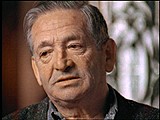You searched for: jewish prisoners
<< Previous | Displaying results 441-450 of 455 for "jewish prisoners" | Next >>
-
Röhm Purge
ArticleThe Röhm Purge (the “Night of the Long Knives") was the murder of the leadership of the SA (Storm Troopers), the Nazi paramilitary formation led by Ernst Röhm. Learn more.
-
Background: Jurists' Trial Verdict
ArticleThe Justice Case, or Jurists’ Trial, of the Subsequent Nuremberg Proceedings tried members of the German justice administration. Browse excerpts from the verdict.
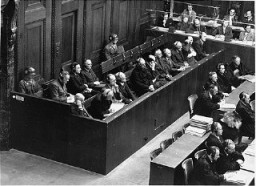
-
What does war make possible?
Discussion QuestionPersecution of Jews and other targeted groups was already government policy in Germany once the Nazis were in power in 1933. But following the German invasion of Poland on September 1, 1939, war provided the opportunity and motivation for more ext...
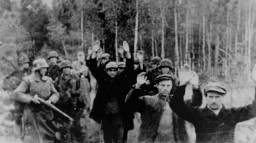
-
Life After the Holocaust: Regina Gelb
ArticleAfter WWII and the fall of the Nazi regime, Holocaust survivors faced the daunting task of rebuilding their lives. Listen to Regina Gelb's story.

-
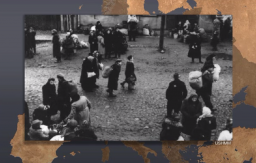
-
Henny Fletcher Aronsen describes liberation from a death march from Stutthof
Oral HistoryHenny was born into an upper-middle-class Jewish family in Kovno, Lithuania. She and her brother attended private schools. In June 1940 the Soviets occupied Lithuania, but little seemed to change until the German invasion in June 1941. The Germans sealed off a ghetto in Kovno in August 1941. Henny and her family were forced to move into the ghetto. Henny married in the ghetto in November 1943; her dowry was a pound of sugar. She survived several roundups during which some of her friends and family were…
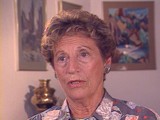
-
Frima L. describes escape from mobile killing unit massacre
Oral HistoryWhile Frima's family was confined to a ghetto, Nazis used her father as an interpreter. He later perished. By pretending not to be Jews, Frima, her mother, and sister escaped a German mobile killing unit massacre. They were later discovered and jailed. Again, her mother devised an escape. Frima's mother and sister were smuggled to Romania, while Frima wandered in search of safekeeping until her mother could arrange to smuggle her out. In Romania, they were reunited and liberated.
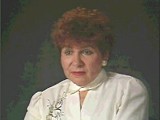
-
Wilek (William) Loew describes the roundup of Jews during August 1942 deportation from Lvov to Belzec
Oral HistoryWilek was the son of Jewish parents living in the southeastern Polish town of Lvov. His family owned and operated a winery that had been in family hands since 1870. Wilek's father died of a heart attack in 1929. Wilek entered secondary school in 1939. Soon after he began school, World War II began with the German invasion of Poland. Lvov was in the part of eastern Poland annexed by the Soviet Union. Although the Soviets took over Wilek's home and the family business, Wilek was able to continue his…
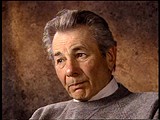
-
Henny Fletcher Aronsen describes a roundup in the Kovno ghetto
Oral HistoryHenny was born into an upper-middle-class Jewish family in Kovno, Lithuania. She and her brother attended private schools. In June 1940 the Soviets occupied Lithuania, but little seemed to change until the German invasion in June 1941. The Germans sealed off a ghetto in Kovno in August 1941. Henny and her family were forced to move into the ghetto. Henny married in the ghetto in November 1943; her dowry was a pound of sugar. She survived several roundups during which some of her friends and family were…
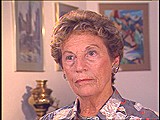
-
Isadore Helfing describes labor in the Treblinka camp
Oral HistoryIsadore was born to a Jewish family in Kielce, Poland. Germany invaded Poland in September 1939. Isadore and his family were forced into the Kielce ghetto, which was established in April 1941. When his parents were deported to the Treblinka killing center in 1942, Isadore went with them rather than remaining behind for forced labor. After arrival at the camp, Isadore hid in a pile of bodies. His parents were killed. Isadore survived by working in the camp. On August 2, 1943, prisoners at Treblinka revolted…
